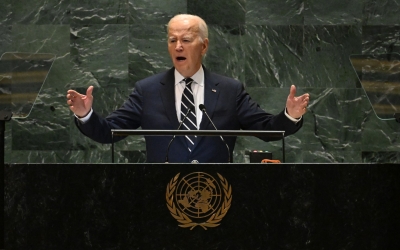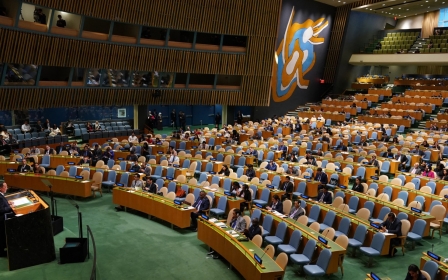UN General Assembly 2024: Israel flouts efforts at peace as allies, world leaders demand ceasefires

World leaders on Thursday continued making impassioned pleas at the 79th United Nations General Assembly at UN headquarters in New York City to stop Israel’s war on Gaza and its escalation of violence in Lebanon.
Palestinian leader Mahmoud Abbas took to the stage with a defiant announcement.
“We will not leave. We will not leave. We will not leave. Palestine is our homeland. It is the land of our fathers, our grandfathers. It will remain ours and if anyone were to leave, it would be the occupying usurpers,” Abbas said.
The Palestinian leader challenged those in the hall about what he called Israel’s “lies” in front of US Congress months earlier, asking them who was responsible for the killing of 15,000 Palestinian children, if not Israel.
He lamented about the 100 families that have been completely erased from Gaza, the spread of famine and disease, and the tens of thousands of deaths and incalculable damage done to the besieged enclave.
New MEE newsletter: Jerusalem Dispatch
Sign up to get the latest insights and analysis on Israel-Palestine, alongside Turkey Unpacked and other MEE newsletters
“Stop this crime. Stop this now. Stop killing children and women. Stop the genocide. Stop sending weapons to Israel. This madness cannot continue. The entire world is responsible for what is happening to our people in Gaza and the West Bank.”
But repeated calls from western nations and Israel’s closest allies have fallen on deaf ears.
Earlier on Wednesday, French President Emmanuel Macron also spoke at great length about Gaza. Decrying the devastating losses of over 41,000 Palestinians, labelling them “an outrage for all of humanity”.
The president, who had called for an emergency UN Security Council meeting later that day to address the escalating crisis in Lebanon and to ensure a “diplomatic voice” be heard, emphasised that this was an urgent cry to prevent a regional conflagration.
“Israel, cannot - without consequence, just expand its operations to Lebanon. France demands that everyone respect their obligations along the blue line.”
Peace 'push'
Meetings between the US and the Biden administration on Wednesday led to a US-French push for a 21-day truce between Israel and Hezbollah, but it was outright rejected on Thursday by Israeli Prime Minister Benjamin Netanyahu.
Haaretz reported on Thursday that Netanyahu initially made verbal commitments to the US but then backtracked on them after facing criticism from factions within his governing coalition.
This week’s UN General Assembly takes place on the heels of deadly air strikes by Israel along the southern border of Lebanon and various suburbs of Beirut, coupled with the recent deployment of additional army brigades to the northern border.
Israel's air strikes on Lebanon have already killed over 600 people.
The push for a truce garnered support from multiple nations, including the United States, Australia, Canada, the European Union, and several Middle Eastern countries, further calling on “the immediate support of the governments of Israel and Lebanon”.
French President Macron cautioned that continued Israeli aggression could breed “a dangerous source of hatred and resentment, jeopardising security for all, including Israel”.
“France will ensure everything can be done so that Palestinian people can finally have a state. Side by side with Israel,” Macron added.
Several groups organised protests outside UN headquarters on Thursday despite the Israeli prime minister’s speech being changed to Friday. Israeli press now reports that the embattled leader’s trip to the US could be cancelled altogether.
Europe's position
The atmosphere at the general assembly remained charged as leaders emphasised the critical need for solidarity and unified measures as the only means to restore peace.
Speaking on behalf of the European Union, Charles Michel, the president of the European Council, also pressed Israel to work towards a peaceful solution, to what is now looking like a war on two fronts, Gaza and Lebanon.
"I say this to the government of Israel: trying to achieve security, without peace, is impossible. Without peace, there cannot be lasting security. A world that is driven by revenge is a world that is less safe."
Michel said that "the security of all Jews" would be compromised unless the Palestinians have their own state and that it would also lead to an "undermining of the international system which cannot be underpinned by double standards".
Over the last 11 months, the US, Israel and the West in general have been accused by the rest of the world of only applying international law when it suits them.
In an address that stretched well beyond the 15-minute mark on Wednesday, Spanish President Pedro Sanchez reaffirmed his nation’s dedication to international values, the principles of international law and responsible stewardship on the global stage.
Sanchez underscored Spain’s steadfast belief in accountability and its relentless fight against impunity, highlighting the critical roles of institutions like the International Court of Justice (ICJ) and the International Criminal Court (ICC) in delivering justice and victim reparations.
The ICJ is currently hearing a case brought forward by South Africa accusing Israel of genocide, and the ICC’s chief prosecutor Karim Khan has sought arrest warrants for Israeli Prime Minister Benjamin Netanyahu and Defence Minister Yoav Gallant.
Both institutions have been criticised and threatened by Israel and the US.
Sanchez went on to stress a collective response to the escalating violence in the Middle East. Spain’s stance on the Gaza war, he said, “has remained the same since October” 2023 and aligns with its own broader principles. “Spain defends peace, human rights, and an international rules-based order.”
Later in his speech, Sanchez highlighted the dire need to address the root causes of the Israeli-Palestinian conflict, declaring it “well past time” to implement a two-state solution and emphasising that peace and security could only be achieved through dialogue and respect for international law.
Global peace and democracy, as the president noted, were under severe pressure. “This very same multilateral system is one which the world built, brick by brick, on the ashes of barbarism,” he warned.
A pivotal moment in his speech was the reaffirmation of Spain’s recognition of Palestine back in May.
The president expressed that this decision reflected the overwhelming support of the Spanish people. “This recognition is aimed solely at furthering peace in the region,” he asserted.
Palestinian leader Abbas on Thursday echoed Palestine's UN member status, asking, "What do we lack to be sitting amongst you? What do we lack to be on the same footing as 194 official member states in the UN?"
Abbas pleaded that the resolution recently overwhelmingly passed on Israel's occupation of Palestinian territories, not be in vain.
"Of the 1000 resolutions taken on the Palestinian people since 1948 until this very day, and not a single one has been implemented yet."
Middle East Eye delivers independent and unrivalled coverage and analysis of the Middle East, North Africa and beyond. To learn more about republishing this content and the associated fees, please fill out this form. More about MEE can be found here.






